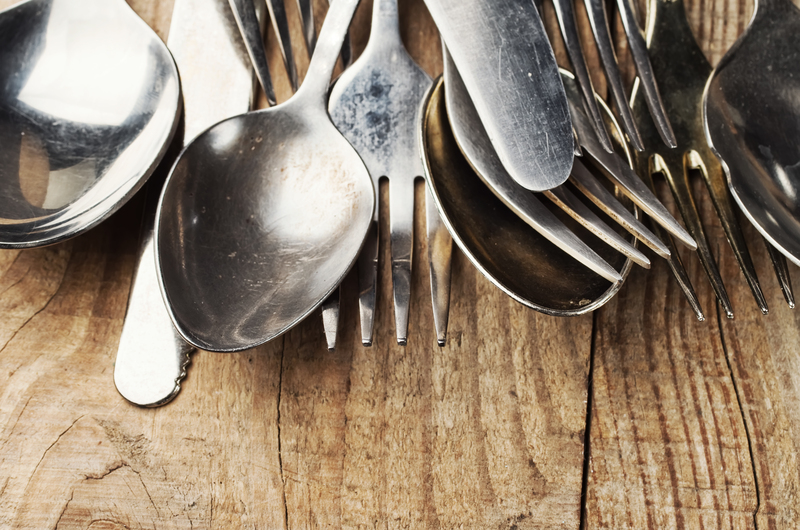Explore the Art of Jewellery Cleaning Methods
Posted on 24/06/2025
Explore the Art of Jewellery Cleaning Methods: The Ultimate Guide
Jewellery is more than just an accessory--it's a reflection of individual taste, personal history, and often, significant investment. Over time, exposure to elements, oils, and daily wear can dull the sparkle of your treasured pieces. That's where understanding the art of jewellery cleaning methods becomes essential. In this comprehensive guide, we will dive deep into various techniques, both traditional and modern, ensuring your jewelry retains its lustre and brilliance for years to come.

The Importance of Cleaning Your Jewellery Regularly
Why should you clean your jewellery? Regular cleaning not only maintains the beauty of your accessories but also ensures their longevity and prevents damage. Dirt, sweat, and oils can build up, eroding metals and clouding gemstones. By understanding the best jewellery cleaning methods for different pieces, you'll keep your treasures shining and safe.
Top Reasons to Clean Your Jewellery
- Maintains the original sparkle and brilliance
- Prevents accumulation of grime and harmful substances
- Ensures structural integrity of delicate pieces
- Keeps gemstones clear and shining
- Improves comfort and hygiene, especially for body jewelry
In the sections below, we'll delve into a variety of jewellery cleaning techniques, helping you choose the best approach for your collection.
Understanding Different Types of Jewellery
Before selecting a cleaning method, it's essential to identify the material and construction of your jewellery. Various metals and gemstones require different care, and the wrong technique could cause irreversible damage.
Common Jewellery Materials
- Gold (Yellow, White, Rose)
- Silver
- Platinum
- Diamonds
- Gemstones (Emeralds, Sapphires, Rubies, etc.)
- Pearls
- Costume Jewellery
Make sure to identify your jewellery's composition before choosing a cleaning method for optimal results.
Professional Jewellery Cleaning Methods
Periodic professional care can ensure your valuable pieces remain in prime condition. Jewellers have tools, solutions, and years of expertise to polish, repair, and restore all types of jewellery.
Types of Professional Cleaning
- Ultrasonic Cleaning: Uses high-frequency sound waves in a cleaning solution to dislodge dirt from hard-to-reach places.
- Steam Cleaning: Harnesses high-pressure steam to clean, sanitize, and restore charm and sparkle.
- Expert Polishing: Jewellers use specialized cloths and pastes to remove scratches and oxidation from metals.
- Rhodium Plating: Recoating white gold jewellery for a bright, reflective finish.
*Professional services are ideal for delicate vintage pieces, family heirlooms, and expensive jewellery with complex settings or soft gemstones. Always entrust your treasures to certified jewellers.
DIY Jewellery Cleaning Methods: Safe & Effective Techniques
For regular upkeep, learning safe home jewellery cleaning methods can make your pieces sparkle in-between professional visits. Here are the most popular techniques, tailored to specific materials:
Cleaning Gold Jewellery
-
Warm Water & Mild Soap:
- Mix a few drops of mild dish soap in a bowl of warm water.
- Soak the gold jewellery for 10-15 minutes.
- Use a soft-bristled toothbrush to gently remove debris.
- Rinse thoroughly under lukewarm water and pat dry with a lint-free cloth.
-
Baking Soda Paste:
- Combine a small amount of baking soda with water to form a paste.
- Apply gently, then rinse and dry.
*Avoid harsh chemicals that can discolor gold.
Cleaning Silver Jewellery
-
Silver Polishing Cloth:
- Ideal for quick touch-ups and removing tarnish.
-
Aluminium Foil Method:
- Line a bowl with aluminium foil, add hot water, and a tablespoon of baking soda plus salt.
- Place silver items in the mixture, ensuring contact with foil.
- After a few minutes, rinse and buff dry.
Note: Do not use abrasive cleaners or scrubs on silver-plated items.
Cleaning Gemstones & Diamonds
-
Mild Soapy Water:
- Safe for most hard stones like diamonds, rubies, and sapphires.
- Soak, brush gently, rinse, and dry.
-
Ammonia Solution:
- For diamonds only, mix one part ammonia to six parts water; clean as above.
- N.B.: Avoid ammonia for softer stones and metals.
*Certain gemstones, such as opals, emeralds, and pearls, require special care--never soak them in harsh solutions or use ultrasonic cleaners.
Pearl Cleaning
-
Gentle Wipe:
- Wipe pearls with a soft, damp cloth after each wear to remove oils and dirt.
-
Mild Soap Solution:
- If deeper cleaning is needed, use a solution of mild soap and warm water.
- Gently run a soft cloth over the pearls, avoiding soaking or submerging them.
Remember: Pearls are organic and porous--keep them away from chemicals, perfumes, and cosmetics.
Cleaning Costume Jewellery
-
Quick Polishing:
- Use a dry, soft cloth for touch-ups.
-
Damp Cloth Method:
- Moisten a cloth slightly (never soak costume jewellery, as glue can dissolve).
- Wipe gently and dry immediately.
Ultrasonic and Steam Cleaners at Home
Modern technology makes at-home ultrasonic and steam jewellery cleaners widely available. While these devices offer convenience, understanding their proper use is crucial for safe and effective cleaning.
Tips for Using Home Devices
- Always read the manufacturer's instructions carefully.
- Never use ultrasonic cleaners for soft gemstones (opals, emeralds, pearls).
- Ensure jewellery is free from cracks or loose settings before cleaning.
- After cleaning, inspect for dislodged stones or damages.
Home devices are best suited for robust items like diamond rings or gold chains, but not for vintage or delicate pieces.
Natural and Eco-Friendly Jewellery Cleaning Methods
If you prefer eco-conscious jewellery cleaning methods, there are several natural alternatives that are both gentle and effective.
- Baking Soda and Water: Create a mild abrasive paste for gold and silver items.
- Vinegar Solution: Mix vinegar and water for a gentle clean (not recommended for pearls or porous gems).
- Lemon Juice: A mild acidity can break down tarnish, but use sparingly and rinse thoroughly.
Tip: Always test on an inconspicuous area first, and avoid harsh ingredients to prevent damage.
Precautions & Mistakes to Avoid When Cleaning Jewellery
Even the most established jewellery cleaning techniques can go wrong if certain precautions aren't followed. To protect your investment, keep the following in mind:
- Check settings and clasps regularly to avoid losing stones during cleaning.
- Never use toothpaste or abrasive cleansers--these can scratch metals and stones.
- Avoid harsh chemicals such as bleach or chlorine, which can corrode metal.
- Be gentle--don't force brushes into delicate crevices.
- Use warm, not hot, water for soaking; extreme temperatures can crack gems.
- Always dry your jewellery thoroughly to prevent moisture-related damage.
Maintaining the Shine: Jewellery Care Tips
In addition to the best jewellery cleaning methods, a few simple habits will keep your collection gleaming:
- Store your jewellery in soft, dry pouches or boxes to prevent scratches and tarnish.
- Keep your pieces separate--avoid tangling and abrasion.
- Remove jewellery before swimming, exercising, or applying lotions and perfumes.
- Schedule annual professional cleanings for expensive or frequently worn items.
- Handle pearls and soft stones with extra care--their surfaces are easily damaged.
These practices, combined with effective cleaning methods, ensure the longevity and aesthetic appeal of every item in your collection.
Advanced Tips: Cleaning Specific Jewellery Types
Antique and Vintage Jewellery
- Consult a professional before any cleaning.
- Avoid soaking or ultrasonic cleaning--old glue and fragile settings may not withstand aggressive techniques.
- Dust with a soft, dry brush; use mild soap and a cloth only if needed.
Watches and Delicate Mechanisms
- Keep moisture away from watchfaces and mechanisms.
- Use a dry, soft brush on exposed surfaces.
- For metal straps, remove and clean separately.

Frequently Asked Questions About the Art of Jewellery Cleaning
How often should I clean my jewellery?
For pieces you wear daily, clean them once a month. For occasional-wear items, every 2-3 months suffices. Always schedule a professional check-up annually.
Is it safe to use ammonia or vinegar on all jewellery?
No. Ammonia is suitable only for diamonds and hard stones. Vinegar can etch some metals and stones. Always research based on your jewellery's material.
Can I clean all my jewellery together?
It's best to clean items made from the same material together. Mixing metals and stones can lead to scratching and damage.
Conclusion: Make Jewellery Cleaning Part of Your Routine
The art of jewellery cleaning methods is a combination of science, care, and tradition. Whether you choose professional services or carefully apply home techniques, regular maintenance preserves the beauty and value of each piece.
- Invest in quality cleaning tools and solutions.
- Identify materials before choosing a technique.
- Seek professional advice for valuable or antique items.
- Remember: a little care goes a long way.
By mastering jewellery cleaning techniques and committing to routine care, your precious accessories will continue to shine and tell their story for generations. Keep sparkling!
Latest Posts
Essential Guide to End of Tenancy Cleaning for Renters
Effective Methods to Eliminate Damp Odors
Wave Farewell to Grease: Effortless Tips for Cleaning Enamel Oven Trays



